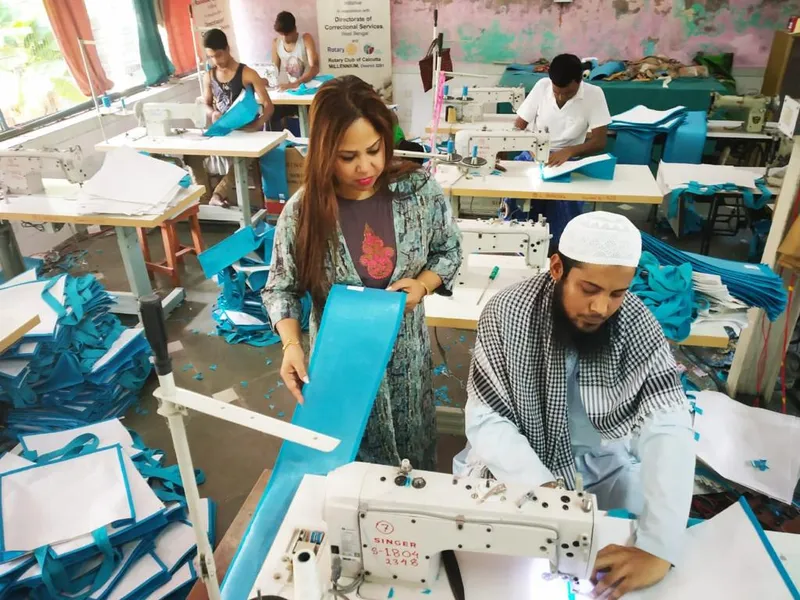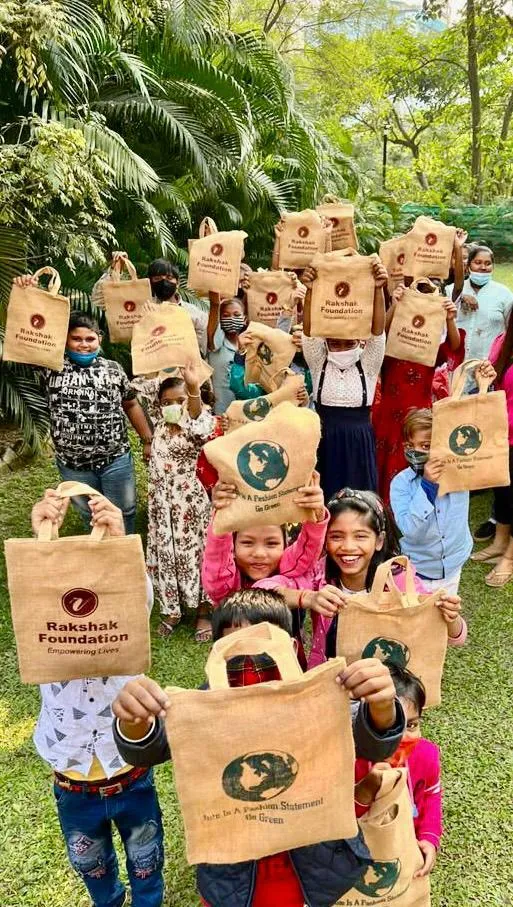A jute startup for inmates: An entrepreneur’s mission to provide dignity behind bars
Chaitali Das started the "Jute Story Beyond Bars" project in 2016 to empower inmates and other underprivileged women through the production of jute products.
One of Chaitali Das’s earliest memories is visiting a courtroom with her father, a public prosecutor when she was five years old. There, she saw a police van unloading people accused of crimes—their hands restrained by handcuffs and a thick rope encircling their waists.
Intrigued, she asked her father about these people. As the accused came out from the police van, their families rushed in, only to be held back by the police.
The anguish and suffering of families left a profound impact on Das.
“I used to think that these prisoners must be some scary-looking people. However growing up I realised that they are ordinary humans capable of change,” she says.
Moved by the plight of inmates—who have to deal with a lifetime of stigma even after the end of their sentence—Das began the "Jute Story Beyond Bars" project in 2016. It was started under Das’s Rakshak Foundation which works towards women's empowerment, skill and livelihood development, social inclusion and eco-conservation.
The project aimed to empower inmates and other underprivileged women by providing rehabilitation and livelihood opportunities. Although it was started as a training project, by 2021 it evolved into a full blown startup–“Root to Jute”.
“I wanted to do something to help restore the dignity, respect and livelihood of these prisoners,” she tells SocialStory.
Making of the Jute Queen

Chaitali Das (in the left)
Born and raised in Alipore, West Bengal, Das’s house was situated between Alipore Central Jail and the Presidency Correctional Home. She recalls hearing screams of people interrogated in the nearby police station.
Growing up near the jail, Das had an insider's view of the prison world that helped her develop sympathy for inmates.
After completing her graduation, she entered the corporate world and later pursued her passion for the stock market while looking after her family.
Das, who is now 50 years old, says that she has always wanted to be a part of social causes, mentioning that social service is in “her DNA”. She believes she inherited this trait from her mother, who was always ready to offer help. Additionally, she states that her husband has consistently supported her in social causes.
Over the years, Das worked with several NGOs. In 2014, she started the Rakshak Foundation which primarily aimed to empower inmates and underprivileged people.
Initially, she provided spoken English training classes for the inmates. Slowly she ventured into other projects such as teaching cookie making, introducing yoga, providing training in woodwork, and conducting painting sessions.
“These projects used to be six months or a year-long,” she adds.
Among all the other projects, the ‘Jute Story Beyond Bars’, gained much attention and evolved into a full-fledged business.
However many people around Das have not welcomed working with the inmates.
“My work was not much appreciated by people as they thought I should instead work for women and children. These people believe that these inmates cannot be changed. But despite these roadblocks I kept going ahead,” she adds.
Empowering inmates
Das collaborated with the National Jute Board of India (NJB) to provide training to the inmates. The 45-day-long training programme was first conducted at the Dum Dum Central Correctional Home. Later, the training sessions were held at Alipore Central Jail and the Presidency Correctional Home.
The prison authorities provided the machines while Das provided the raw materials as well as trainers. The products produced during these sessions were displayed in exhibitions and the money collected was deposited in the inmates' account.
"While brainstorming project ideas I came across the idea of providing training sessions to empower them in producing jute products. However, it's important to note that at this point, these were purely training sessions, and we had no plan to turn it into a concrete business plan," she adds.
However, to sustain the model, providing training was not enough. So, in 2021, Das got the startup incubated by the Indian Institution of Management Centre of Innovation Park, Government of India. Two years later, she also opened an offline studio to display products made by the artisans.

Children holding jute bags
Das believes that despite India being the largest producer of jute, the material has been somewhat overlooked, and its products are often considered outdated. Therefore, she made the deliberate choice to use jute as a material, to revive the forgotten textile.
The startup produces jute products such as handicrafts, rugs, clothes and handbags. The price range for the products starts at a modest Rs 100 and goes up to Rs 5,000. Additionally, her foundation created the Guinness World Record for creating the largest jute bag in the world on January 7, 2021. The bag measures 30.68 m (100 ft 8 in) wide and 24.87 m (81 ft 7 in) high.
The startup procures fabric from Jutex, accessories from the wholesale market, raw jute from jute growers in Baruipur and dye from indigo, beetroot, and hibiscus.
So far, Das and her team have trained 2,000 inmates and 15,000 underprivileged women in and around Kolkata in producing jute products. The startup has also started selling jute products to countries like Canada and Switzerland.
Das takes bulk orders through her offline studio, established contacts and exhibitions as well. The startup also gets orders from government departments, Chambers of Commerce, and organisations such as the Life Corporation of India.
A beneficiary of Das’ venture—Debashish Nath was in the correctional home for 14 years and was disowned by his family after his release. With Das' assistance, he began working with her.
"I'm glad to be back after my time in the Correctional Home. I plan to start making jute handicrafts on my own," he says.

Jute bags
Das wants to remove the stigma surrounding offenders. She acknowledges that society often considers offenders as deserving punishment even after their sentence has ended. Das firmly believes that vocational training plays a transformative role in altering public perceptions.
"Through participation in vocational training, not only do public perceptions towards these inmates change but it also empowers them with the skills necessary to earn a livelihood,” she says.
Additionally, Das also believes that poverty or insufficient resources are key factors contributing to criminal activities. She sees addressing these root causes as essential in preventing crime and fostering a more inclusive and supportive environment.
“These individuals are capable of change and through this project I am doing my bit in facilitating their smooth rehabilitation,” she adds.
Edited by Affirunisa Kankudti







